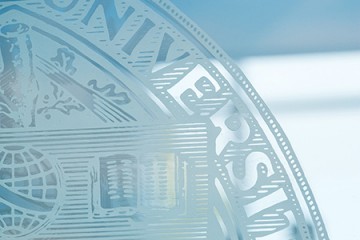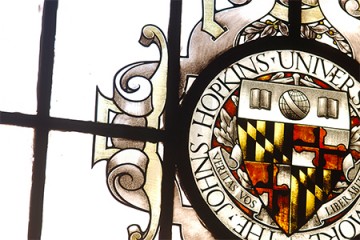It was a great night of cocktails and music, good food and casual collegiality, a gathering of some of the best and the brightest working across every academic arena in the Johns Hopkins community. But more than anything, the third annual Catalyst and Discovery awards reception on Sept. 7 at the George Peabody Library was a celebration of ideas.
"The search for life on other planets drives everything we do," said Sarah Horst, an assistant professor in the Krieger School's Department of Earth and Planetary Sciences, one of 34 winners in the Catalyst category.
In her quest to come close to answering what might be mankind's greatest curiosity, Horst is working on a project called Planets in a Bottle, in which gases are pumped into a two-liter bottle along with energy "to study how life modifies atmosphere, and atmospheric chemistry modifies life."
Why?
"To see what happens," said Horst.
To see what happens—the essence of all knowledge.
"What you do lies at the heart of the university," said President Ronald J. Daniels, welcoming winners and their guests. "We revel in your success."
The Catalyst Awards—$75,000 each—"ensure we [are] giving a break to those newly minted in the academy," said Daniels, noting that nearly three-quarters of the Catalysts went to assistant professors.
Oscar Bettison, who is on the Composition faculty at Peabody, said, "I write for classical instruments, but I do very weird things with them." The weird things Bettison will pursue with his Catalyst grant are called Undiscovered Islands: New Music for Wrench-a-phones and Human Beings.
What's a wrench-a-phone? Exactly what you think. Ask your plumber.
Discovery Awards, given this year to 85 faculty members and APL staff, range from $100,000 for pioneering collaborative work to $150,000 for projects seeking larger grants from outside the university.
"I think everyone's career is a result of a pioneer," said Marin Alsop, conductor of the Baltimore Symphony Orchestra and director of Peabody's graduate conducting program. "Sometimes pioneers don't even know they are pioneers."
Alsop was awarded a Discovery grant to co-produce We Conduct, a documentary about female conductors (of which there are few) with Bernadette Wegenstein, a research professor and director of the Center for Advanced Media Studies in the Krieger School.
"It's a music film," said Wegenstein, "with Marin at the heart of it."
Sometimes, Daniels said, such collaborations are "spontaneous," while others are more strategic, such as the "speed dating"–style events Hopkins holds from time to time to introduce great minds to one another, folks who otherwise might not cross paths.
The annual Catalyst and Discovery reception—at which all winners are invited to eat and schmooze and toast one another's success in a relaxed atmosphere—helps facilitate such partnerships.
Among the far-flung subjects: How blindness might yield better understanding of the plasticity of the brain (Marina Bedny, KSAS), the possibility that hydrogels can support stroke recovery (Ryan Felling and Steve Zeiler, both SOM; Hai-Quan Mao, WSE; and J.D. Tovar, KSAS), and the trajectory of opioid use (Shannon Frattaroli, Renan Castillo, Elise Omaki, and Wendy Shields, all BSPH; and Eric Strain, SOM).
This year's Discovery grantees are working in 26 "cross-divisional teams" such as the one that partners Kathleen H. Burns, an associate professor of pathology in the School of Medicine, and Christopher E. Bradburne, chief scientist at the Applied Physics Laboratory. Their project: Long-Read Sequencing Technologies for Precision Pharmacogenomics. Much of that sequencing—3 billion or so genetic units—has been characterized as "junk" because of long repetitions. Yet, there may be treasure in that junk (no one knows), and this is what Burns, a cancer researcher, wants to find out.
At his end of the partnership, Bradburne will be working to see how a better understanding of the human genome can aid the development of "precision" medicine. "I would like to figure out a better way to [type] people and apply that to the way they metabolize a particular drug," he said.
Throughout the evening, gratitude was paid to Denis Wirtz, vice provost for research, who, Daniels said, has guided the university through three cycles of the Catalyst and Discovery awards—178 grants culled from more than 1,000 applicants since the inception of the two programs.
One of the great lines delivered at the event came from Provost Sunil Kumar, who told the crowd: "This is like the check you get from your grandmother on your birthday. This is a big deal," he said. "We expect to brag about you for years to come."
Posted in University News, News+Info, Happenings
Tagged catalyst awards, discovery awards









